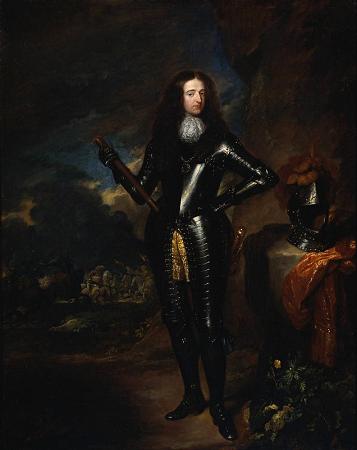James II (1633 - 1701). James II and VII was King of England and Ireland as James II and King of Scotland as James VII, from 6 February 1685 until he was deposed in the Glorious Revolution of 1688. he is portrayed in art with a focus on his regal bearing and military background, often reflecting both his authority and the controversies surrounding his reign. In formal portraits, such as those by Sir Godfrey Kneller, James is depicted in royal robes with the crown and scepter, emphasizing his legitimate kingship and the grandeur of the monarchy. These portraits often show him wearing armor, underscoring his military experience and his role as a commander, especially during his time as Duke of York before becoming king. Frequently he has a solemn expression, reflecting the gravity of his reign, marked by religious and political tensions that eventually led to his deposition in the Glorious Revolution of 1688. Some later portraits or allegorical artworks emphasize his Catholic faith and exile, particularly after his overthrow, portraying him either sympathetically as a martyr or critically as a failed ruler. His representation often evokes a complex mix of authority, conflict, and the historical significance of his short and tumultuous reign. The last Roman Catholic monarch of England, Scotland and Ireland, his reign is now remembered primarily for struggles over religious tolerance. However, it also involved the principles of absolutism and divine right of kings and his deposition ended a century of political and civil strife by confirming the primacy of Parliament over the Crown. James inherited the thrones of England, Ireland and Scotland from his elder brother Charles II with widespread support in all three countries, largely based on the principle of divine right or birth. Tolerance for his personal Catholicism did not apply to it in general and when the English and Scottish Parliaments refused to pass his measures, James attempted to impose them by decree; it was a political principle, rather than a religious one, that ultimately led to his removal. In June 1688, two events turned dissent into a crisis; the first on 10 June was the birth of James's son and heir James Francis Edward, threatening to create a Catholic dynasty and excluding his Protestant daughter Mary and her husband William of Orange. The second was the prosecution of the Seven Bishops for seditious libel; this was viewed as an assault on the Church of England and their acquittal on 30 June destroyed his political authority in England. Anti-Catholic riots in England and Scotland now made it seem only his removal as monarch could prevent a civil war. Representatives of the English political elite invited William to assume the English throne; after he landed in Brixham on 5 November 1688, James's army deserted and he went into exile in France on 23 December.
more...












